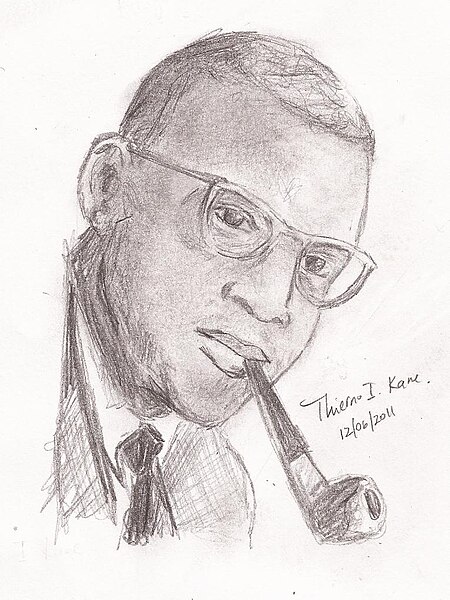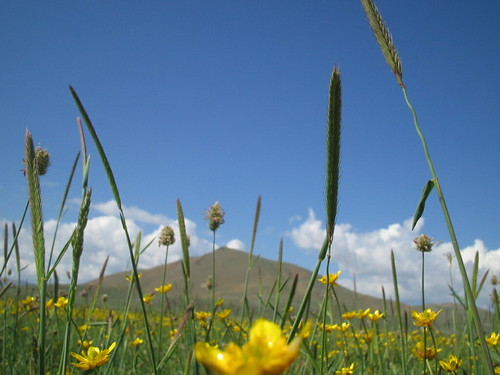Ikot Abasi, also called Opobo, formerly Egwanga, port town, Akwa Ibom state, southern Nigeria. The town lies near the mouth of the Imo (Opobo) River. Situated at a break in the mangrove swamps and rain forest of the eastern Niger River delta, it served in the 19th century as a collecting point for slaves. In 1870 Jubo Jubogha, a former Igbo (Ibo) slave and ruler of the Anna Pepple house of Bonny (28 miles [45 km] west-southwest), came to Ikot Abasi and founded the kingdom of Opobo, which he named for Opobo the Great, a Pepple king (reigned 1792–1830). Also called Chief Jaja by Europeans, he destroyed the economic power of Bonny and made Opobo the leading power of the eastern Niger delta oil-palm trade until he was deported in 1887 by the British, who established a trading post at Opobo Town, 4 miles (6 km) southwest, on the west bank of the Imo River. Modern Ikot Abasi serves as a trading centre for the yams, cassava (manioc), fish, palm produce, corn (maize), and taro produced by the Ibibio people of the area; it also is known for boatbuilding, although a sandbar partially blocks the entrance to its port from the Gulf of Guinea. The town is linked by highway to Aba and Port Harcourt. Pop. (2006) local government area, 132,023.
In the case where fear presses back
Through the air, where the torch has expired
On the orphan river,
In the forest, soulless and tired,
Under the anxious and faded trees,
In the wan woods, squalling trunks
Ululate without respite
Over the accursed tom-toms,
Black night! Black night!
Dans la case où la peur repasse
Dans l'air où la torche s'éteint,
Sur le fleuve orphelin
Dans la forêt sans âme et lasse
Sous les arbres inquiets et déteints,
Dans les bois obscurcis
Les trompes hurlent, hululent sans merci
Sur les tam-tams maudits,
Nuit noire ! Nuit noire !
- Major unrest in Burkina Faso last year
- Ethno-religious strife in Nigeria's middle belt
- Al-Quaeda-inspired terrorism in Nigeria's North
- The Nigerian fuel subsidy removal unrest
- An oil spill by Shell almost as bad as the Deepwater Horizon disaster (in terms of environmental impact rather than barrels of oil)
- South Sudan's independence
- Eradication of Rhinderpest
- Famine in East Africa
- The arrest of Gbagbo in Côte d'Ivoire following the mayhem he caused after elections
- The election of Ellen Johnson Sirleaf in Liberia
- One of the most engaging African Cup of Nations competitions in my own memory (OK I had to throw that last bit in there).
Écoute plus souvent
les choses que les êtres.
La voix du feu s'entend,
entends la voix de l'eau
écoute dans le vent
le buisson en sanglots.
I found the above video with the poem's recitation. I translate it thusly:
Listen more often
To things than to beings.
The fire's voice is heard,
Hear the voice of the water
Listen in the wind
To the bush a-sobbing.
Out! Out! You must be prised right out
Joyless desire and love's conceit!
You've cranked at my heart such a treat,
Nothing's left there for your grubby onslaught.Now for my own good may I forget about,
Shrug off this tenant of my very suite.
Out! Out! You must be prised right out!I took you in without sufficient thought.
Get out! Go find yourself another beat!
Don't even skirt my heart's remotest street!
Too long I've dwelled cowed by your harsh, grim clout.
Out! Out! You must be prised right out!
Untitled - by Alain Chartier I turn you out of doors
tenant desire you pay no rent
I turn you out of doors
all my best rooms are yours
the brain and the heartdepart
I turn you out of doorsswitch off the lights
throw water on the fire
I turn you out of doorsstubborn desire

I turn you out of doors. Alain Chartier. BoLoP tr. by Edward Lucie-Smith
XI. Dehors ! dehors ! Il vous fault deslogier,
Désir sans joye et pensée d'amours. . .
Rondel de dix vers : Grenoble, n° 874, fol. 60 ; ms. du
cardinal de Rohan, fol. 80 v°; Lyon, n° 1235. Publié dans
Lyon- Revue, 1886, p. 315.
Rondeau/Chanczon XIDehors ! dehors ! Il vous fault deslogier
Desir sans joye et pensee d'amours!
Tant aves fait en mon cuer de voz tours
Qu'il n'y a plus pour vous que fourragier. Nonchaloir vueil desormais hebergier
Avec oubly pour moy donner secours.
Dehors ! dehors ! Il vous fault deslogier! Je vous receu ung pou trop de legier.
Departez vous! Allez logier aillours!
N'aprochez plus de mon cuer les faulxbours!
Trop ay vescu soubz vostre dur dangier.
Dehors ! dehors ! Il vous fault deslogier!
Doubting truth in unseen things
I seek the literal tree,
The prickly fruit, the leaves, the flowers
Some posit it to be.Uproot the tree of vegetable love
And plant a swooning spray—
I'm well across the gospel of
Our prelate Chartier.If love is nectar blossoming
But fades to autumn grief,
What heroes championing what gods
Are left to my belief?
This world glistens like a summer lamp saying open, open
In the time it takes to speak, everything could disappear.
What is that spark when you meet a friend, which crackles with instant recognition? And what is that spark multiplied like a moonless night sky's field of fireworks? It might be something like what I experienced at the Western Colorado Writers' Forum's annual conference in Grand Junction this past weekend.
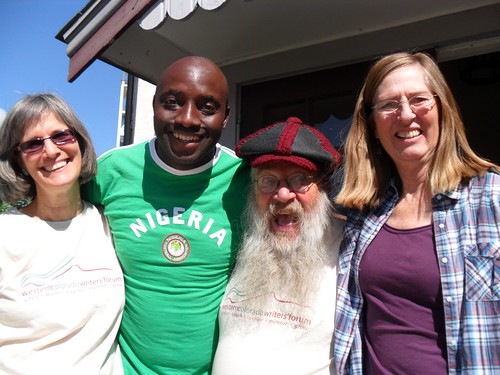
What better place to call home
than this high desert cloud mesa wrong turn
rippling of the continental plates
before they slap down
fanning towards the Coast?
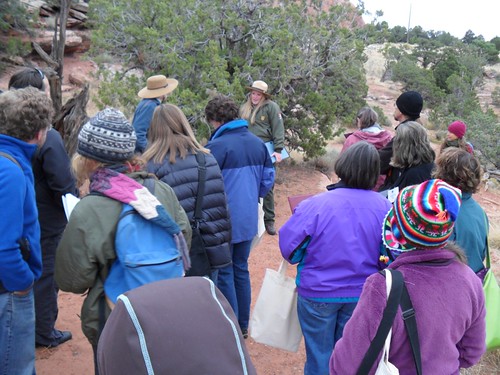
We have no prairies
To slice a big sun at evening
Everywhere the eye concedes to
Encroaching horizon, Is wooed into the cyclops' eye
Of a tarn. Our unfenced country
Is bog that keeps crusting
Between the sights of the sun. They've taken the skeleton
Of the Great Irish Elk
out of the peat, set it up
An astounding crate full of air.

We have no tarn toMottle the copperplate faceOf rough entrada.We've no black peat, dry fossilColorado, we repeat.
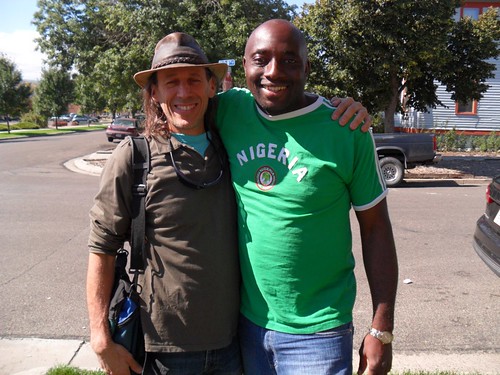
It wasn’t the moon
that swooned me, but
the edge of the moon,
cratered and rough,
the shadow line
where substance ends
and space begins.
Maybe that is why we go on talking,
always trying to show someone we're here,
and look--I have a past just like you do,
a stream of words that fills the empty night
and sweetens troubled dreams, or so we hope,
and tells us not to linger long on bridges
staring at all the water passing by.I thought my whole ambition was to make
the past and present come together, dreamed
into a vivid shape that memory
could hold the way the land possesses rivers.
They in turn possess the land and carry it
in one clear stream of thought to drink from
or water gardens with.I learned that I must first talk to myself,
retelling stories, muttering a few
remembered lines of verse, to make the earth
substantial and to bring the sunlight back.
Only bone, like the shadow, knows
that lasting metaphors are born
of architects and alchemists,of those who love the arch
and beam, and of the fleshy need
to leave and have something remain.
As for the second point, I say what our faith says, and the truth of the matter. At a certain time a motion begins which is not precipitated by another motion and this occurs in this very manner: that there has been eternally a first mover, although there was not eternally a first moved; but at a certain time the first moved began, and then motion began.
Quantum ad secundum, dico quod secundum fidem nostram et rei veritatem. Aliquando incepit motus quem non precessit aliquis motus et hoc per istum modum quod eternaliter fuit primum motor, licet no eternaliter fuerit primum mobile; sed aliquando inceperit, et tunc incepit motus.

People! The world today is in a very difficult situation,
And we all know it because we're the ones who created it;
We're gonna have to be the ones to clean it up;
We're gonna have to learn to live together
And love each other.
Because I believe one day someone or something
Is gonna wanna judge
Who's creating all this corruption and death and pollution,
All these difficult situations on earth.And he's gonna wanna know:
Who's gonna take the weight?

LET man's soul be a sphere, and then, in this,
Th' intelligence that moves, devotion is ;
And as the other spheres, by being grown
Subject to foreign motion, lose their own,
And being by others hurried every day,
Scarce in a year their natural form obey ;
Pleasure or business, so, our souls admit
For their first mover, and are whirl'd by it.
Hence is't, that I am carried towards the west,
This day, when my soul's form bends to the East.
There I should see a Sun by rising set,
And by that setting endless day beget.
But that Christ on His cross did rise and fall,
Sin had eternally benighted all.
Yet dare I almost be glad, I do not see
That spectacle of too much weight for me.
Who sees Gods face, that is self-life, must die ;
What a death were it then to see God die ?
It made His own lieutenant, Nature, shrink,
It made His footstool crack, and the sun wink.
The first leader of a newly independent Ghana
Faced many a challenge to visions of utopia;
The vision is based on science and agriculture;
Here come the vultures shitting like pigeons on a sculpture.
Nobody's perfect, yo! he's got faults you can list them... Dr. Nkrumah's intentions were the best
Why it's all a mess cause we still needed lots of help from the West...Kennedy and his foreign aid
During the cold war turning Ghana into economic slaves... Military coup after coup it's appaling
Seventh time a charm: enter Jerry Rawlings...There once lived a great man with a geat vision, great plan,
A great dreamer determined to realize what he'd seen for Africa
Things fell apart at the seams in Ghana...We salute ya, we salute ya,
Dr. Kwame Nkrumah

We are the punch bag of fate
on whom the hands of destiny wearies
and the show of blows gradually lose
their viciousness on our patience
until they become caresses of admiration
and time that heals all wounds
comes with a balm and without tears,
soothes the bruises on our spirits.
Je vis, je meurs: je me brule et me noye,
J’ay chaut estreme en endurant froidure:
La vie m'est et trop molle et trop dure.
J'ay grans ennuis entremeslez de joye: Tout à un coup je ris et je larmoye,
Et en plaisir maint grief tourment n'endure:
Mon bien s'en va, et à jamais il dure:
Tout en un coup je seiche et je verdoye. Ainsi Amour inconstamment me meine:
Et quand je pense avoir plus de douleur,
Sans y penser je me treuve hors de peine.Puis quand je croy ma joye estre certeine,
Et estre au haut de mon desiré heur,
Il me remet en mon premier malheur.
Je vis, je meurs; je ris, je pleure.Je vis de la mer; je vis de la terre.Je le dis aux fleurs; au lac de vapeur.Au ciel de toutes les couleurs,Ton soleil réchauffe mon cœur.Je vis, j'ai peur; je crie de douleurs.En secret je m'enterre: je cherche la chaleur.Je m'enfuis dans les airs; au delà de la terre.Au ciel de toutes les couleurs,Ton soleil réchauffe mon cœur.
I live, I die; I laugh, I cry.
I live of the sea; I live of the ground.
I say it to the flowers; to the lake of steam.In the all-colored sky,
Your sun warms my heart.I live, I die; I scream of pain.
I bury myself secretly: I am seeking heat.
I abscond into the air; beyond the earth.In the all-colored sky,
Your sun warms my heart.
Labbé's sonnet famously brings Petrarca's style of antithetical tropes into French. Just this morning Au-delà came up in my shuffled playlist and I remembered I'd resolved to translate it, to see if I could preserve some of its music, which has eluded translations I've seen so far. Here is an excerpt from my attempt:
All at a stroke I laugh and I lament,
And suffer many torments in my pleasures:
They live forever, my absconding treasures:
All at a stroke I wither and augment.
The morning glory climbs above my head,
Pale flowers of white and purple, blue and red.
I am disquieted. Down in the withered grasses something stirred;
I thought it was his footfall that I heard.
Then a grasshopper chirred. I climbed the hill just as the new moon showed,
I saw him coming on the southern road.
My heart lays down its load.
I love this peaceful blue evening
It is absolutely a castle of the East
I love this cloud with its golden mane
It is absolutely a lantern of the East
I love this wind with its smell of flowers
It is absolutely the fragrance of the East
You say "While the omniscient P.O.V is admissible in Haiti, a country known for its oral tradition, it was frowned upon in American literature." I'm not much for American fiction but that startled me. If it's true, it probably helps explain why I'm not much for American fiction.
Let’s imagine for a second that the robin
is not a contained entity moving at speed
through space, but that it is a living change,
unmaking and remaking itself over and over
by sheer unconscious will, and that
if we were to slow down the film enough
we would see a flying ball of chaos,
flicking particles like Othello counters,
Before anything had a soul,
While life was a heave of Matter, half inanimate,
This little bit chipped off in brilliance
And went whizzing through the slow, vast, succulent stems.
I believe there were no flowers, then,
In the world where the humming-bird flashed ahead of creation.
I believe he pierced the slow vegetable veins with his long beak.
The records show that in Shanghai
at the end of the Yuan Dynasty,
the year 1364, a glassblower blew
a mermaid that came to life, and swam
away. And in Cologne, in 1531, a team
of glassblowers blew an orchestra,
instruments and all, and these played.
Then on Hokkaido, in 1846, a blind
monk blew his own Buddha to pray to,
and the next day he was able to see.
Pretty pretty robin!
Under leaves so green
A happy blossom
Hears you sobbing sobbing
Pretty pretty robin
Near my bosom.
Solvency or luxury—adapted from "The Madison Front" by Uche Ogbuji
Or modesty of revenue—
Campaigners seem to want all three
But most that they can have is two.
There is a general succession of events in which contraries are
produced by periodical vicissitudes; labour and care are rewarded with
success, success produces confidence, confidence relaxes industry, and
negligence ruins that reputation which accuracy had raised.

